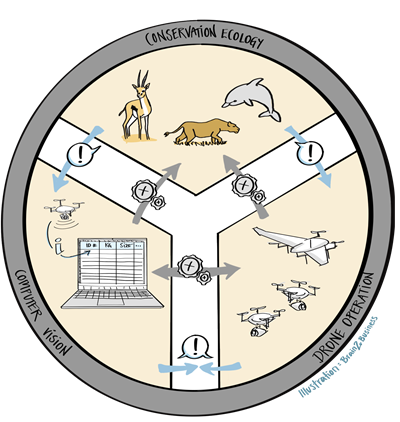The rapid decline of wildlife populations has prompted an urgent need for more effective and feasible nature conservation practices. The new training network called ‘WildDrone’ aims to revolutionize wildlife conservation practices by using autonomous drone technology as a unifying platform to monitor wildlife populations, track their movements, and manage human-wildlife conflicts.
The doctoral network is funded under the EU Marie Skłodowska Curie Actions and the consortium consists of partners from across Europe, Africa, and the U.S. with expertise in the fields of aerial robotics, computer vision, and wildlife ecology.
Ph.D. students trained in drones and computer vision for nature conservation
The WildDrone consortium will recruit and train a total of 13 doctoral candidates (Ph.D. students), equipping them with the unique combination of multidisciplinary skills required to realize the full potential of drones and companion autonomous systems for nature conservation missions.
The doctoral candidates will have their base at the European partner universities and will be working closely together in the training network. As part of their education, the doctoral candidates will be conducting study trips and field work in Europe, USA, and Africa.

The technological challenges of operating drones in unstructured environments
Drones have proven to be highly effective for observation tasks in nature conservation scenarios. However, technology for nature conservation must be reliable, economically effective, and able to operate in remote, unstructured environments with minimal infrastructure. Drones currently lack the technological maturity required for widespread use in this field: They are often perceived as unreliable, time-consuming, and costly to use in ecological experiments and nature conservation.
For these reasons, WildDrone aims to develop robust and predictable robotic technologies at a variety of prices, including effective and automated means of gathering and interpreting ecological and behavioural data.
Development of autonomous drones to protect endangered species
Based on the technological developments, the WildDrone network will enable the use of autonomous drones to protect endangered and vulnerable species more efficiently and in greater numbers, while minimizing the risk of injuries to humans and wildlife.
The development of technologies suited for autonomous nature conservation missions currently presents an immense technological challenge. However, the partners hope that by combining their expertise in aerial robotics, computer vision, and wildlife ecology - and by using autonomous drone technology as a unifying platform - they will be able to revolutionize wildlife conservation practices.
MSCA-DN network run from Denmark
Professor and Head of SDU UAS Center, Ulrik Schultz Lundquist, will coordinate the global network from the University of Southern Denmark, and one of the first tasks will be to recruit a total of 13 doctoral candidates for the training network.
The interdisciplinary network has been granted under the Doctoral Networks Call 2021 in the EU Marie Skłodowska Curie Actions (MSCA-DN) and will start on January 1, 2023 and run for 4 years.
WildDrone partners
Beneficiaries and self-funding partners: Max Planck Institute of Animal Behavior, University of Münster, WIPSEA, Wageningen University, Bruno Kessler Foundation, Avy, EPFL, University of Bristol, and University of Southern Denmark.
Associated partners: Ol Pejeta Conservancy, National Park Wadden Sea, British Broadcasting Corporation (BBC), Kenyatta University, University of Konstanz, Bristol Zoological Society, KBR Wyle Services, LLC, Danish Environmental Protection Agency, Kuzikus African Safaris PTY, Danish Agriculture & Food Council, and WWF Schwitzerland.
More information
Visit the WildDrone project website on https://wilddrone.eu/
+870x375/overview.jpg?h=3000&iar=0&w=5300&hash=216522FEDB85E09A6B796C0F340309C2)